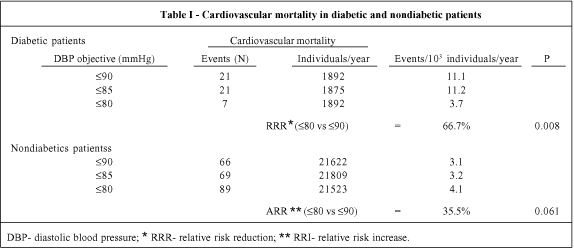OBJECTIVE: To use published Hypertension Optimal Treatment (HOT) Study data to evaluate changes in cardiovascular mortality in nondiabetic hypertensive patients according to the degree of reduction in their diastolic blood pressure. METHODS: In the HOT Study, 18,700 patients from various centers were allocated at random to groups having different objectives of for diastolic blood pressure: <=90 (n=6264); <=85 (n=6264); <=80mmHg (n=6262). Felodipine was the basic drug used. Other antihypertensive drugs were administered in a sequential manner, aiming at the objectives of diastolic blood pressure reduction. RESULTS: The group of nondiabetic hypertensive subjects with diastolic pressure<=80mmHg had a cardiovascular mortality ratio of 4.1/1000 patients/year, 35.5% higher than the group with diastolic pressure <=90mmHg (cardiovascular mortality ratio, 3.1/1000 patients/year). In contrast, diabetic patients allocated to the diastolic pressure objective group of <=80mmHg had a 66.7% reduction in cardiovascular mortality (3.7/1000 patients/year) when compared with the diastolic pressure group of <=90mmHg (cardiovascular mortality ratio, 11.1/1000 patients/year). CONCLUSION: The results indicate that in hypertensive diabetic patients reduction in diastolic blood pressure to levels <=80mmHg decreases the risk of fatal cardiovascular events. It remains necessary to define the level of diastolic blood pressure <=90mmHg at which maximal reduction in cardiovascular mortality is obtained for nondiabetics.
arterial hypertension; HOT Study; diabetes mellitus

